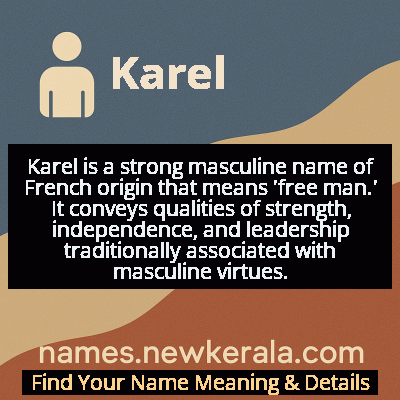Karel Name Meaning & Details
Origin, Popularity, Numerology Analysis & Name Meaning of Karel
Discover the origin, meaning, and cultural significance of the name KAREL. Delve into its historical roots and explore the lasting impact it has had on communities and traditions.
Name
Karel
Gender
Male
Origin
French
Lucky Number
2
Meaning of the Name - Karel
Karel is a strong masculine name of French origin that means 'free man.' It conveys qualities of strength, independence, and leadership traditionally associated with masculine virtues.
Karel - Complete Numerology Analysis
Your Numerology Number
Based on Pythagorean Numerology System
Ruling Planet
Moon
Positive Nature
Diplomatic, friendly, artistic, empathetic.
Negative Traits
Over-sensitive, moody, indecisive, prone to self-pity.
Lucky Colours
Green, cream, white.
Lucky Days
Monday.
Lucky Stones
Pearl, moonstone.
Harmony Numbers
1, 3, 4.
Best Suited Professions
Diplomats, mediators, caregivers, artists.
What People Like About You
Cooperative spirit, friendliness, artistic talent.
Famous People Named Karel
Karel Čapek
Writer and Playwright
Coined the term 'robot' in his play R.U.R. and was one of Czechoslovakia's most influential writers
Karel Appel
Painter and Sculptor
Founder of the COBRA avant-garde movement and internationally renowned expressionist artist
Karel Gott
Singer
Czech Republic's most successful singer, known as the 'Golden Voice of Prague' with over 50 million records sold
Karel Sabina
Writer and Political Activist
Czech revolutionary writer and librettist for Bedřich Smetana's opera The Bartered Bride
Name Variations & International Equivalents
Click on blue names to explore their detailed meanings. Gray names with will be available soon.
Cultural & Historical Significance
Throughout history, bearers of this name have often been associated with leadership, strength, and intellectual achievement, making it a name that conveys both tradition and authority. In the Czech context specifically, Karel has been borne by several important historical figures including King Karel IV, who made Prague an imperial capital and founded Charles University. The name embodies a sense of cultural pride and historical continuity, connecting modern bearers to a rich tapestry of European history and achievement.
Extended Personality Analysis
Individuals named Karel are typically perceived as strong, reliable, and intellectually curious. They often exhibit natural leadership qualities combined with a practical approach to problem-solving. The name suggests someone who is both grounded and ambitious, capable of making difficult decisions while maintaining a sense of fairness and justice. Karels are often seen as pillars of strength in their communities or families, providing stability and guidance during challenging times.
They tend to be methodical thinkers who value knowledge and education, often pursuing careers that allow them to exercise both their analytical skills and their innate sense of responsibility. While they can be reserved in unfamiliar situations, those who know them well appreciate their loyalty, dry wit, and unwavering commitment to their principles. The combination of strength and intellect associated with the name creates a personality profile of someone who is both capable and thoughtful—a person who leads not through force but through wisdom and reliability. This balance makes Karels particularly effective in roles that require both strategic thinking and interpersonal skills.
Modern Usage & Popularity
In contemporary times, Karel remains a popular name in Czech-speaking countries and has maintained steady usage in the Netherlands and other Central European nations. While its popularity has fluctuated over the decades, it continues to be chosen by parents who value traditional names with strong historical roots. In France and other Western European countries, the name is less common but still recognized as a distinctive variation of Charles. Recent years have seen a slight resurgence in its usage as parents seek classic names that are familiar yet distinctive from more common forms. The name maintains its appeal across generations, bridging traditional values with modern sensibilities, and is often associated with intelligence, reliability, and cultural sophistication.
Symbolic & Spiritual Meanings
Symbolically, Karel represents freedom, strength, and leadership. The original meaning of 'free man' extends metaphorically to represent independence of thought and action. The name carries connotations of reliability and steadfastness, much like the historical figures who bore variations of it. In many cultures, it symbolizes the bridge between tradition and progress—honoring historical roots while embracing forward-thinking ideals. The name also embodies the concept of intellectual freedom and the pursuit of knowledge, reflecting the many scholars, writers, and thinkers who have carried this name throughout history. It suggests a person who is both grounded in reality and capable of visionary thinking, making it a name that balances practical wisdom with imaginative potential.

